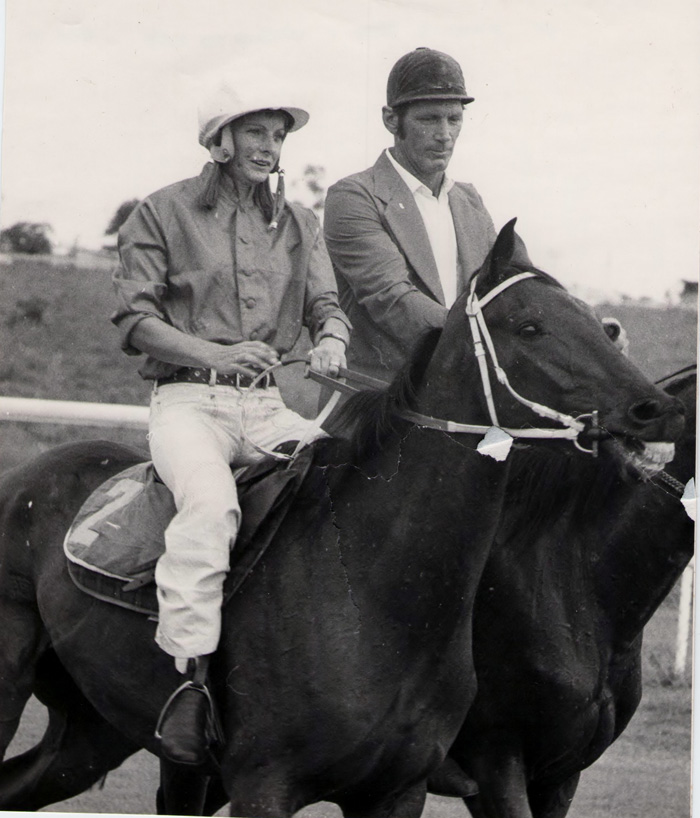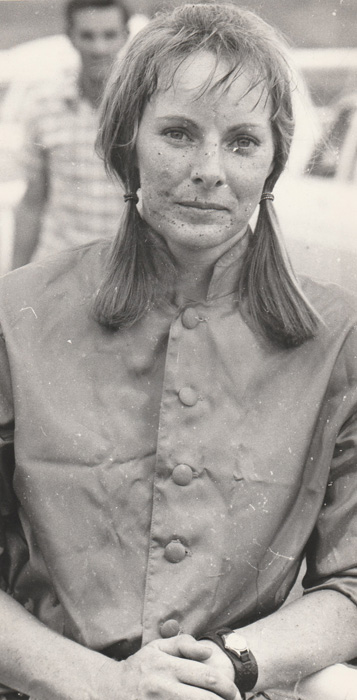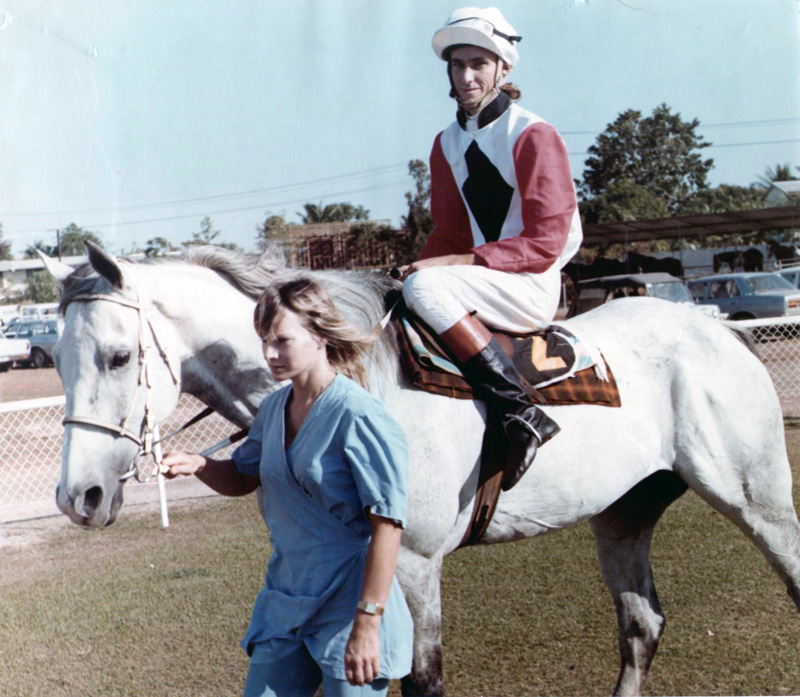





Loretta Smith
Loretta Smith rode races as a jockey in Australia in the 70’s and this is her really neat story:
FOTH: Where were you born and where did you grow up?
LS: I was born in Mentone, Victoria (Outer Melbourne), went to Mentone Girls Grammar School, and lived in that general area for 28 years before moving to Darwin in Northern Territory.
FOTH: What sort of girl were you growing up and what did you want to be when you were growing up?
LS: A bit of a tomboy. A mad animal lover, particularly horses, and I dreamt of being a mounted policewoman even though they only had men in the mounted police in those days.
FOTH: When did you start to develop a love for horses and what are some of your early memories about being around them?
LS: I Always loved horses, and my parents raced a couple of horses which were trained by a very close old family friend (Jack Bond) so I started spending time at his home on weekends during my school years. He had been a lighthorseman in WW1, and taught me the basics of horsemanship and horse handling. I can't remember learning to ride, but early memories include always riding bareback, and jumping the lead ponies over old batten hurdles he had set up in a paddock, quite often just with a head collar - no bridle. I learned to swing up on the tallest of horses. I remember the stable cat always having her kittens in with one particular horse, who never ever stood on one.
FOTH: Tell me about your 1st job you had at a racetrack and early on did you know you wanted to be a jockey?
LS: I started riding work for 'Uncle' Jack on a couple of his quiet gallopers. As far as I remember, there were no other women riding trackwork at the local track - Epsom - and some of the trainers were quite upset as it 'wasn't right for a girl'. This was in the days before skull caps of any kind were compulsory. The first time I ever rode on the track was on a horse called Lord Lindsay, I remember the name well because I was so 'chuffed' to be actually out there in a man’s world for the first time. WOW!!! ......out on the track, trotting and cantering with the blokes ..... unbelievable then. At that time in the early 1960's, racing was still very much a man’s world, no women trainers or jockeys, and I seem to remember that women could only race a horse in partnership with a male.
Never did I have any idea of, or dream about being a jockey.
FOTH: Looking back how tough was it in becoming a jockey and what would you say was the toughest thing you had to go through to become one?
LS: When I rode as jockey, with men, at several registered race meetings in 1975, women were unable at that time to obtain a jockey’s license anywhere in Australia. The establishment was holding out against females riding, although I was granted a trainers license. I rode with permission from Darwin Turf Club because there was a shortage of jockeys due to a bunch of poorly educated horses of all ages being introduced to the local racing scene. In December 1974 Cyclone Tracey had all but wiped out the city of Darwin including the racing industry, which was staggering along with about 25 thoroughbreds left to race every Saturday, and often twice, to make up fields. The Turf Club purchased several hundred district bred horses from local cattle stations, and in a popular ballot, they were leased out to local people to increase the racehorse population. These horses were usually by a thoroughbred sire, from a station mare, and barely broken in, unused to much handling, had never been shod, and only ridden several times a year by stockmen when used for cattle mustering. They were referred to as 'yang yangs' and sorted the riders out, the wheat from the chaff, the horsemen from the jockeys - some of the licensed boys refused to ride, especially when they found out there was to be a female in the fields....... (how damn embarrassing for them to be shown up!) I think the resentment of some of the male jockeys and trainers was the toughest thing to cope with, and found that I had to prove myself even more than the guys. I think female jockeys still have to prove themselves more than their male counterparts.
FOTH: Did it feel natural getting up on a horse or were you scared at all on getting up on horses?
LS: I've always felt at home on a horses back, and whilst a few made me cautious, I was never scared.
A classic example is when I won first-up against the men - riding a stockmans length but being the only jockey in the race to use a race saddle. These horses dropped their heads if you pulled your knees up!
FOTH: What were some of the best pieces of advice you were given early on?
LS: Never be frightened to lengthen your stirrups - your neck is more valuable than looking good - and to be kind to a horse’s mouth.
FOTH: Now in saying that, what piece of advice would you give to a young girl that wanted to become a jockey?
LS: Make sure you can ride bareback - better balance - and be prepared to tough it out, but most of all, give it a go!
FOTH: So did you gallop/ride horses for a long time before you took out your jockey license?
LS: Yes, for many years, during which time I often did it for the love. In the early days I never got paid, but getting out on a horse, any horse, anywhere, was something I could never get enough of.
Women were allowed to ride in ladies races at amateur meetings. The races were called Ladies Bracelets and the girls were riding to win at any cost - whips across the back were common, and no prisoners were taken! I rode several races in the 1960's at Healesville and Pakenham racecourses.
FOTH: While you were doing all this, did you have a lot of naysayers and people trying to talk you out of becoming a jockey?
LS: There were always knockers of women either riding or training, but on the other hand there were plenty of people who realize that horses often respond better to a female. In the very early days some of the old timers found it hard to come to terms with women intruding in their man’s world and egos, and some of the excuses were laughable, with warnings of dire consequences should women be allowed in a race, but I have to admit that no one was ever rude or unpleasant to my face (behind my back was no doubt a different kettle of fish!)
FOTH: What did you parents think of the idea of you becoming a jockey?
LS: They were always fine with me riding as they had seen me grow up loving horses, and in particular thoroughbreds.
FOTH: Ok the big day comes and your riding your 1st race. What track was it at and what do you remember about it? Was there a big crowd on hand at the races that day and where did you finish?
LS: 29th November, 1975. Fannie Bay Racecourse (Darwin, Northern Territory). There was a big crowd due to the introduction of the new horses and owners. My horse SERENDIPITTY was owned by a bookmaker .....started favorite, and I won by 5 lengths after missing the start (a walk up start at that). Local Newspaper made a big deal out of me beating the boys and some of the boys were less than impressed. According to the NT NEWS it was the first time anywhere that a woman had openly ridden against men at a registered race meeting.
FOTH: Now after that race did things get a bit easier for you or no?
LS: For the next few meetings I was allowed to ride in several more races. After the win, I had a second and two fourth places from memory. Darwin racing was administered by the Australian Jockey Club in Sydney, and when they saw results including women jockeys, they immediately banned us from riding any more. Trudie Frankel had also ridden in several races against the men by then.
FOTH: How long did you ride for and what tracks did you ride at?
LS: Amateur - Healesville and Pakenham race courses in Victoria ... 1966 & 1967 ( Loretta Kelley -maiden name) professional - Fannie Bay Racecourse in Northern Territory - 1975 (Loretta Smith - married name)
FOTH: What are some of your favorite memories as a rider?
LS: Having been a trailblazer, and proving that we girls were as good as anyone else who threw a leg over a horse, whether it was raising eyebrows riding track work as a teenager in a totally male environment, or mixing it with the other jockeys who were game enough to ride uneducated horses at a professional meeting.
One day at the track when girls were still a real novelty, I got thrown into a fence by a mare who promptly did a tap dance on my stomach and legs. This happened right in front of the 'touts box' and the watching trainers all started dithering before someone hit on the idea of picking me up on the stretcher. They rolled me onto the stretcher, and when they lifted it I fell right through to the ground again as it was rotten! Hmmm, I was put in a car and carted off to hospital for a short stay. No ambulances in those days.
Getting dumped in bitterly cold surf when a horse I was cantering in knee deep water did a somersault, leaving me sitting in the water with the bridle in my hand, is one of my favorite humorous memories, though at the time I was more worried about freezing to death !! Being the work rider of a Melbourne Cup placegetter was fantastic, as there's nothing better than riding a horse with a big motor, even if this particular horse dumped me over his head on several occasions when he plaited his legs. The horse, Welltown, was a gentleman, and he'd stop and wait for me to swing back on (see how handy that ability proved to be?) before we continued on our merry way. Over the years I discovered that horses can laugh at you, act like spoiled brats, work their hearts out for you, and generally have a wonderful variety of personalities.
FOTH: What are some of your not so favorite moments and did any male riders try and give you a bunch of crap while you were a jockey?
LS: I've been incredibly lucky in all my riding considering some of the animals I've ridden - no serious injuries. The guys who've given me 'crap' over the years have generally been guys who obviously felt inadequate as a rider anyway, and if I was some sort of threat then it wasn't worth getting down and dirty over.
FOTH: What led to you retiring and what did you do with yourself after you retired?
LS: I retired as a jockey due to circumstances beyond my control!!! I was never officially licensed, and was banned from any more race rides as women in Australia were still unable to be licensed jockeys. I have had a trainer’s license for many years between 1975 and 2008 in the states of Northern Territory, Western Australia and Queensland, and only handed that in when I required open heart surgery in Dec 2008.
FOTH: Do you still follow the sport at all or did leave the sport behind when you retired?
LS: I'm no longer involved in racing unfortunately. I still follow the big races and good horses, but haven't been to the races for several Years. I actually find it unsettling because it was a huge part of my life for many years, and jogs a lot of memories.
FOTH: While you were riding, did you ride with many other female jockeys?
LS: One other girl rode in Darwin during the time I was riding - Trudie Frankel.
FOTH: Will we ever see a Triple Crown winner and if no, why not?
LS: Of course, sooner or later it will happen when someone has total faith in a good jockey and not worry that she's female.
FOTH: Do you think racetracks need casinos to survive these days?
LS: I'm in Australia, and cannot comprehend having a casino at a racetrack. It just doesn't happen here, and racing is doing just fine thank you.
FOTH: Did you ever have any problems with your weight while you were riding and do you think the weights should be raised by a couple pounds or no they are good where they are?
LS: I never had a weight problem whilst riding. Not sure of your weight scale in USA, but I think weights have been raised slightly in Australia to accommodate the fact that people are bigger in these latter generations.
FOTH: While you were riding, could you make a decent living being a jockey?
LS: Ha ha, I never had the chance, and as a matter of fact, I never got a riding fee for any races I rode in even at the professional meetings.
FOTH: If you could would you change anything about your time as a jockey?
LS: Looking back I think it was all a great experience and wouldn't change a thing.
FOTH: What were some of the biggest differences that you had to adapt to being a trainer as opposed to being a jockey?
LS: As a trainer you have total responsibility for a horse’s preparation, and working with the animal 24/7. You select its feed and work regime, and hope to keep it fit and content, plus sometimes deal with difficult owners. A jockey who rides the horse track work as well is invaluable in being able to get the feel of the horse, and then tell the trainer. It's up to the trainer to then put that information to use (or not). I was lucky in being able to ride work on the horses I trained for years - I never had a very big team, and loved being able to learn what make each horse tick, something you often didn't have time to do if only being a jockey. Mind you there are some jockeys who are brilliant at reading the horses they ride, and it shows in their riding results.
FOTH: Loretta, thumbs up for doing this interview and I hope you had fun doing it and any last words to wrap this up?
LS: Chris it's been a blast, and I've got so many memories rising to the surface after this interview that I feel like I could keep on and on and bore you to tears. Schooling horses over brush hurdles at the track, no helmet, no whip, just a lot of faith in the horse and my own ability to get us over in one piece ...... being able to swing up on a horse 17.3 hands tall ....... strapping horses at the races in a collar, tie and jodhpurs ........ wearing my butt out when I got to use a brand new exercise saddle on a 2 hour off track slow work out. Ohhhh, the saddle sores .....!!
Back to our main
page